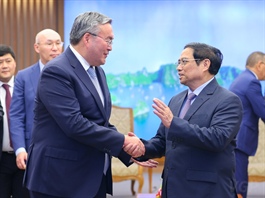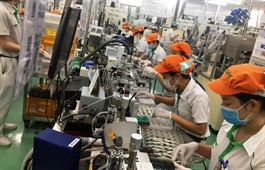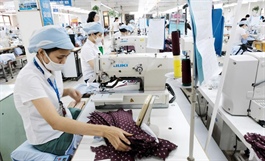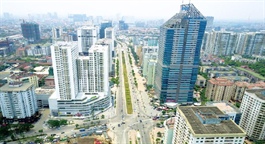Ho Chi Minh City’s foreign enclaves settle into 'new normal'
Ho Chi Minh City’s foreign enclaves settle into 'new normal'
Since Vietnam officially declared the COVID-19 pandemic under control earlier this year, foreign enclaves in Ho Chi Minh City have, once again, begun to bustle, with old stores resuming their operations and new shops opening every day in commercial spaces that sat unoccupied for months on end.

Once Vietnam dropped its on-arrival COVID-19 testing requirement for foreign travelers and reopened its international air routes in mid-May, the number of foreigners entering the country began to increase, paving the way for foreign enclaves in Ho Chi Minh City to return to their pre-pandemic life.
In Tan Phong Ward, District 7, home to a significant portion of the South Korean community in Ho Chi Minh City, many stores that shut down between late 2020 and early 2022 are once again open for business, and new shops are moving into commercial spaces that have sat empty for months.
Kim Yong Min, a South Korean national living in District 7, shared that his eyeglasses stores, which mainly target South Korean and Japanese tourists, are nearly ready to reopen.
All that is left, Kim said, is installing new glass doors and arranging furniture.
In addition to his District 8 store, Kim also owns a second eyeglasses store in the Thao Dien urban area in Thu Duc City, a district-level administrative unit in Ho Chi Minh City
Kim’s business was put on hold in 2020 when COVID-19 broke out in Vietnam.
Since then, he has been able to hold on to his rented commercial spaces due to his lessor offering reduced rent.
He now looks forward to opening his doors to new customers.
Similarly, Kim Gun Ho, owner of a 3D golf simulator in Tan Phong Ward, closed his business and returned his rented space to his lessor during the peak months of the pandemic.
Recently, however, he signed a new lease and reopened his 3D golf simulator.
Trinh Van Ket, owner of the mart, shared that his business offers products imported from South Korea, and up to 80 percent of his customers are South Korean families.
“South Korean enterprises want to introduce their products [to Vietnam], so I put their products on my shelves to serve South Korean customers in Vietnam," Ket said.
“Despite lower-than-expected revenue, I expect my turnover to be stable next year when more South Koreans enter Vietnam."
In the education sector, Kim Seong Keun, a representative of the Asobi South Korean culture education center, said classes for South Korean children in both the Thao Dien urban area and in District 7 have reopened after a long shutdown.
'Japan Town' back to normal
Nestled in the heart of District 1, 'Japan Town,' which comprises the alleyways behind Le Thanh Ton Street, now sees customers around the clock.
The pitch-dark alleys and closed bars that littered Japan Town throughout the pandemic have since been replaced with busy, crowded entertainment venues.
H., owner of a bar in Japan Town, said most bars in the neighborhood pay a significant amount in rent, and many that closed during the pandemic have finally been able to reopen.
Many of the customers that frequent these bars are Japanese nationals living in Vietnam.
Aside from bars, new shops, supermarkets, and restaurants pop up in the neighborhood every day.
Japanese store Ribeto Gyomu on Thai Van Lung Street has benefited from the neighborhood’s revival.
The store welcomes a steady stream of customers all night, every night.
While calculating a bill for a customer, Do Thi Nhu Ha, manager of the store, happily said that despite only reopening in July, the store welcomes many customers.
According to Ha, Ribeto Gyomu wanted to open its store in Ho Chi Minh City as soon as the city reopened its economy, but was not able to afford the US$3,000 monthly rent.
“We are now meeting about 70 percent of our expected business, which is a positive sign," Ha said.
“The pandemic is still here, so it’s still difficult to import goods from Japan to Vietnam.
"On September 4, we will officially open the store and expect to have more customers than we have now.
“If our business results are good, we will try to open more stores in Ho Chi Minh City.”
Located at the intersection of Le Thanh Ton and Thai Van Lung Streets, Japanese restaurant Sukiya has also seen a high number of customers since reopening.
Restaurant manager Nguyen Thi My Hanh said the restaurant’s revenues are still about half of what they were pre-pandemic, but figures have been still up since it reopened last October.
Sukiya has opened two more locations in the city, Hanh noted.
Despite revenues not quite back to pre-pandemic numbers, areas of Ho Chi Minh City long known as 'foreign hubs' such as the Thao Dien area in Thu Duc City, the 'Malaysian Street' on Nguyen An Ninh Street in District 1, and the Ho Thi Ky Market, also called 'Cambodian Market,' in District 10, have been gradually recovering.
Having closed his store and returned the space after 10 years doing business in Ho Chi Minh City, Mohamad Faris returned to the city in June.
He opened a Khadijah Muslim clothing store on the Malaysian Street to the west of Ben Thanh Market.
Faris’s cousin has also reopened the Wy & Rine fashion shop just footsteps from his store.
According to Faris, his family is well-known in the clothing trade and his family’s products are sold to both Malaysian customers and other stores throughout Vietnam.
However, as his rental fees amount to VND130 million ($5,546) per month, the pandemic forced him to return the space.
“If the night market is reopened, the number of customers will increase further. Travel firms said that more foreigners would come in September, so I have high hopes in my business,” Faris said.
New shopping trends have emerged in the wake of the pandemic, including selling goods via live streams on Facebook at his store.
Faris’s store, for example, is able to sell an average of VND60-70 million ($2,561-2,988) worth of products per live stream.
Business success has been seen Thao Dien, where new stores and restaurants have opened and older restaurants have reopened.
A representative of Lang Man Oc Restaurant, which is owned by a South Korean national, said the restaurant has had stable operations since Vietnam reopened to foreign guests.
Mai Kim My, an employee of Japanese restaurant Namara Hokkaido in the Thao Dien area, said the number of foreign customers, especially Japanese nationals, has climbed.
Both floors of the restaurant are often fully occupied, Ly noted.
At the Cambodian Market, food stalls are also, once again, bustling.
Thanh Mai, owner of Tu Xe Restaurant, said that she has seen many more customers since reopening post-pandemic.
Many foreigners and overseas Vietnamese have also come to the market to buy dried fish for export to the U.S. and Europe, Mai added.
Crowded Bui Vien Street
Bui Vien Walking Street in District 1, Ho Chi Minh City has had an eventful summer season with a surging number of visitors.
A survey of the restaurants along the street showed that the number of visitors since the pandemic has been higher than in the summer of 2019.
On weekend nights, the street is packed with both local youth and international tourists.
Nearby Bui Vien, De Tham, and Nguyen Thai Hoc Streets have seen their fair share of guests as well.
According to the manager of a bar on Bui Vien Street, more and more guests show up each night, and turnover has skyrocketed since the beginning of summer.
“In terms of quantity and spending, Vietnamese guests are dominant," the manager shared.
“Although the number of foreign guests is still low compared before the pandemic, bars in the area are doing well.”
Trinh Nguyen Hung Dung, director of Millennium Travel Co. Ltd. and an investor in many large bars on Bui Vien Street, told Tuoi Tre (Youth) newspaper that over the past four or five years, service investors on Bui Vien Street have renovated their facilities and their businesses have been stable.
Local businesses expect the number of foreign guests to rise during the rest of the year. At present, most customers are Vietnamese, Dung noted.
Dung added that his bars are full on weekends, which has led him to enhance his recruitment and employee training.
The peak summer travel season for domestic tourists is drawing to a close, while the winter holiday of international travelers from Europe, America, and Australia will start in October.
Therefore, this is the golden time to compete with other countries in the region to welcome international arrivals to Vietnam, Dung said, adding that it is a must to present Vietnam as a safe destination with relaxed procedures.
Even if tourists are infected with COVID-19, they should receive good medical support.
Enterprises should get ready to serve international visitors between October and December, Dung advised.























